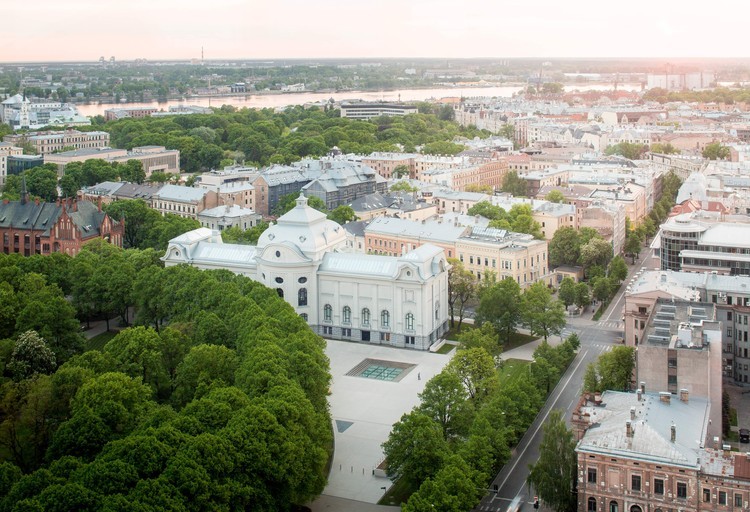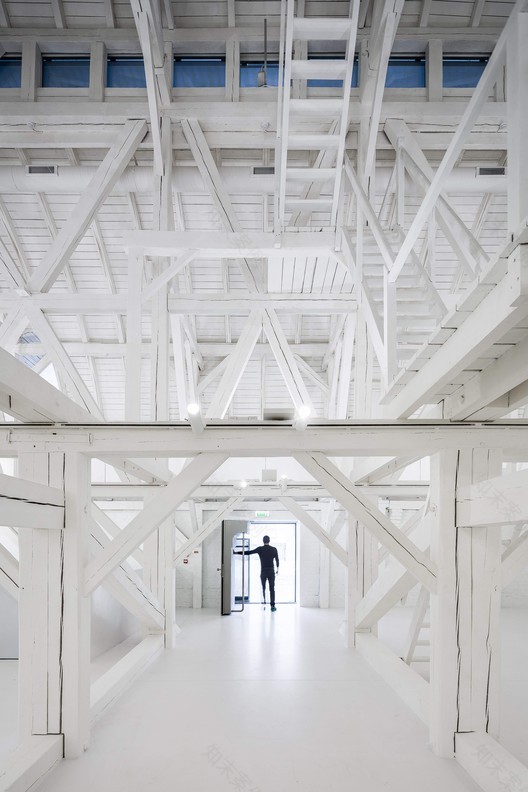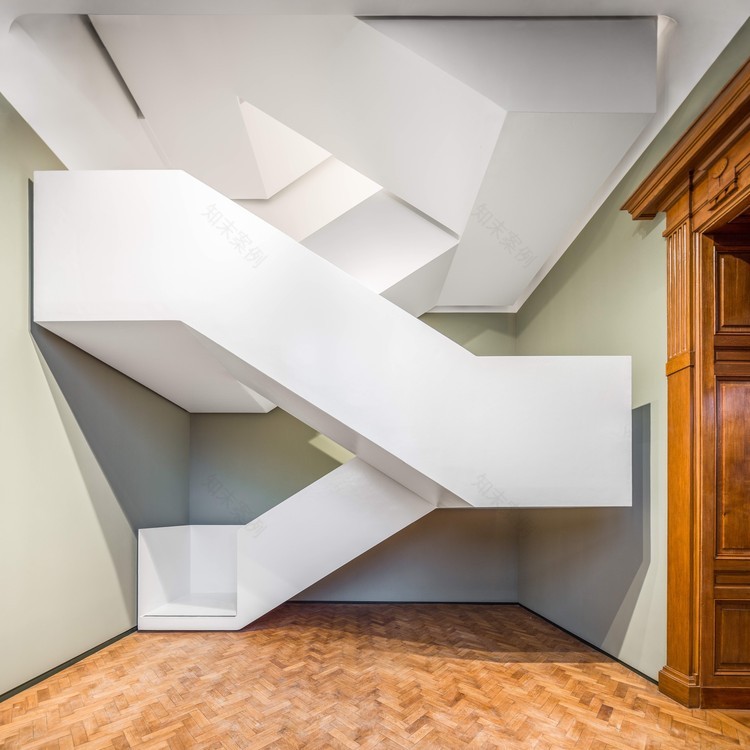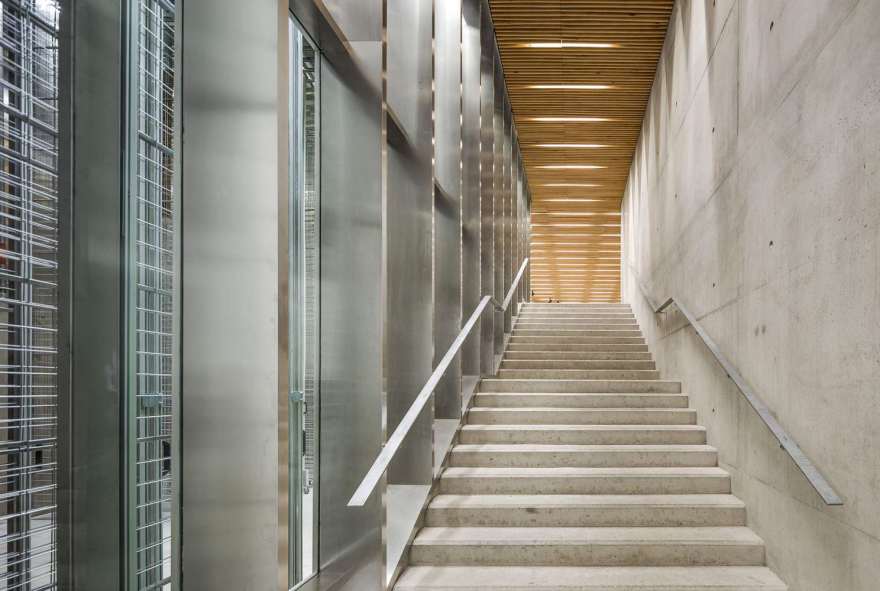查看完整案例


收藏

下载
© Norbert Tukaj
里加拉脱维亚国家艺术博物馆重建战略的三个方面
Three Aspects of the Reconstruction Strategy for the Building of the Latvian National Museum of Art in Riga
© Norbert Tukaj(Norbert Tukaj)
考虑到该建筑独特的建筑结构、其代表性的重要性以及对文化遗产的重大贡献,拟议的扩展战略基于:
Considering the unique architecture of the building, its representational importance and significant contribution to the cultural heritage, the proposed extension strategy is based on:
-保留现有的建筑能力和真实细节;
-retention of the existing building capacity and authentic details;
© Norbert Tukaj(Norbert Tukaj)
-需要更新和扩大博物馆的功能,使其具有清晰的现代容量,并巧妙地减少额外空间的设计;
need for renewal and extension of museum functions in the clearly expressed modern volume and subtle minimal design of the additional spaces;
-重新设计现有建筑的功能战略,以便更有效地利用和符合人体工程学的扩展。
-redesign of the functional strategy of the existing building enabling more efficient use and ergonomic integration of the extension.
© Norbert Tukaj(Norbert Tukaj)
基于以下几个方面,我们提出了一个功能和美学平衡的设计方案,以恢复、重建和扩建拉脱维亚国家艺术博物馆的建筑,保持现有建筑作为一个历史城市地标,确保其现代化功能。
Based on the following aspects, we offer a functionally and aesthetically balanced design project for the restoration, reconstruction and extension of the building of the Latvian National Museum of Art preserving the existing building as a historical urban landmark and ensuring its modern functionality.
© Norbert Tukaj
遗产方面
Aspect of Heritage
目前的博物馆建筑被认为是一座国家建筑纪念碑,并被列为国家重点建筑 6530 号,是里加最具代表性的建筑之一。据工程介绍,其修复的目的是最大限度地保留建筑的功能元素,利用现代技术和维护原有的装饰细节。
As the current museum building is regarded a national architectural monument and listed building of the state significance No. 6530, it is one of the most representative architectural objects in Riga. According to the project, its restoration is intended with the maximum preservation of the functional building elements, use of the modern technology and maintenance of the original decorative details.
© Norbert Tukaj
Aesthetic Aspect
为解决展览馆空间不足的问题,对现有的闲置建筑空间进行了调整,增加了功能,形成了集中在地面以下新展区的新展位。通过将新的延伸部分置于地面之下,就有可能最大限度地保护作为历史城市地标的建筑物。在博物馆大楼如此特殊的位置旁边,只添加了一个带有黄铜圆形剧场的中立混凝土庭院。
To solve the problem of shortage of the exposition space, we offer the adjustment of the existing unused building space, additional functions, as well as formation of new exhibition spaces concentrated in the new extension, which is designed below the ground level. By such placement of the new extension below the ground level it is possible to maximize the preservation of the building as the historical urban landmark. Next to such exceptional position of the museum building, only the neutral concrete courtyard with an amphitheatre in brass is added.
功能方面
Functional Aspect
我们致力于博物馆建筑的现代化建设,致力于发展博物馆的功能战略,并提请注意空间的重新分配和合理的分类、现有和未来博物馆馆舍和功能的分组和联系。因应博物馆的需要,我们采取了下列功能方法:
Working on modernization of the museum building, we have concentrated on the development of the functional strategy, also drawing attention to redistribution of space and logical classification, grouping and connection of the existing and future museum premises and functions. In response to the needs of the museum, we have come to the following functional approach:© Norbert Tukaj(Norbert Tukaj)
-我们建议在没有新的地面书籍的情况下,兴建临时展览、贮藏室,并在地面以下的新支线内兴建修复工场及附属设施。
Leaving the site free of any new ground-based volumes, we propose to construct the space for temporary exhibitions, storages with restoration workshops and ancillary facilities in the new extension below the ground level.
-在地下延伸处,在公园和博物馆大楼之间,我们建议建立一个广场式的社交空间,包括室外咖啡馆、视频放映、露天艺术设施和其他公共活动。
Above the underground extension, in between the park and museum building, we suggest a square – stylized social space with an outdoor café, video projection, art installations in the open air and other public events. © Norbert Tukaj (Norbert Tukaj)
-一楼适用于博物馆的行政和公共活动-- 教室、餐厅/餐厅、会议厅、儿童教育班,可以从街道和公园边进入。大楼中央的新楼梯井将一楼与新的延伸部分和一楼的主大厅连接起来。
- The ground floor is adapted for administrative and public functions of the museum - classrooms, cafeteria/ restaurant, conference hall, children’s education classes, which can be accessible both, from the street and park side. New stairwell in the central part of the building connects the ground floor with the new extension and the main hall on the first floor.
© Norbert Tukaj
除了旧楼现有的展览空间外,我们建议把冲天炉及部分现时未使用的阁楼用作展览空间。为了符合展览空间的要求,我们建议安装天窗和自然光控制。
- In addition to the existing exhibition space in the old building, we propose to use the cupola and part of the currently unused attic as the exposition spaces. To comply with the requirements for the exposition space, we propose to install skylights with natural light control.
-为了方便和实际使用,我们建议重新设计屋顶的部分,使其能够容纳一处露台和如画的全景,同时允许二楼展览馆的自然光通过原来的天窗进入。令人印象深刻的冲天炉空间可用于临时安装和进入屋顶露台。
- For convenient and practical use, we suggest to redesign the part of the roof in a way that it could accommodate a terrace with picturesque panoramas, while allowing the natural light in on the second floor exhibition galleries through the original skylights. The impressive cupola space could be used for temporary installations and for access to the roof terrace © Norbert Tukaj (Norbert Tukaj)
公开档案和讲习班
Exposed Archives and Workshops
新的展览馆与历史建筑明显不同,主要是博物馆的技术和附属馆舍。在通往展览厅的公共通道 (入口坡道) 上行走,参观者可以观察博物馆以前和传统上看不见的内部馆舍,例如艺术品收藏档案。从玻璃覆盖的中庭的展览厅和上面的玻璃地板上都可以观察到修复车间。展览交付运输的大型 12,0x3,5m 升降平台整合到露天露台中,为新扩建区大堂的游客提供自然光线和偶尔的景观。(鼓掌)
The new extension is clearly distinguished from the historic building and hosts primarily the technical and ancillary premises of the museum. Walking through the public access loop (the entrance ramp) to the exposition halls, visitors can observe the previously and traditionally invisible inner premises of the museum, such as archives of art collections. The restoration workshops can be observed both, from the exhibition hall in the glass covered atrium and from above, while walking on the glass floor. The large 12,0 x 3,5m lifting platform for exhibition delivery transport is integrated into the open air patio and provides natural light and occasional view for the visitors in the lobby of the new extension.
© Norbert Tukaj(Norbert Tukaj)
© Norbert Tukaj
Public Square
广场的主要目的是作为公众集会的平台,从而扩大博物馆展示艺术品的可能性。为方便功能使用而提出的单石混凝土表面也暴露了旧博物馆作为雕塑的标志性形状,并清楚地标志着地下博物馆扩建的新卷。(鼓掌)
Main purpose of the square is to serve as a platform for public gatherings thus extending the museum’s possibilities to display art objects. The monolith concrete surface proposed for easier functional use also exposes the iconic shape of the old museum as a sculpture and clearly marks the new volume of the underground museum extension.
Ground Floor
在广场中央,我们建议在广场底部有一个 9×9 米玻璃覆盖的中庭,让参观者通过它观察博物馆的日常生活,同时充当展览空间的天窗。
In the middle of the square, we propose an amphitheatre with the 9 X 9 m glass covered atrium at the bottom for the visitors to watch through it observing the everyday life of the museum, while also functioning as a skylight for the exhibition space. © Norbert Tukaj (Norbert Tukaj)
Architects Processoffice and Andrius Skiezgelas Architecture
Location Riga, Latvia
Category Museums & Exhibit
Architect in Charge Vytautas Biekša, Rokas Kilčiauskas, Marius Kanevičius, Andrius Skiezgelas
Area 8249.0 m2Project Year 2016
Photographs Norbert Tukaj
客服
消息
收藏
下载
最近

































